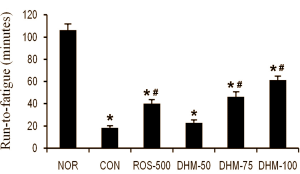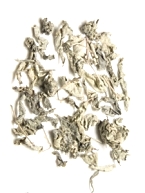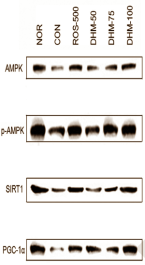|
At 5 km above sea level Ampelopsis grossedentata boosts sports performance
Tea made from the Chinese climbing plant Ampelopsis grossedentata is already known in the West and used against hangovers, and goes by the name of Rattan Tea or Vine Tea. And it may just be that extracts of Ampelopsis grossedentata are about to make their entry into the sports world. According to an animal study done at the Third Military Medical University in the Chinese Chongqing, the most important active ingredient in Ampelopsis grossedentata boosts endurance capacity in an oxygen-deprived environment.
Dihydromyricetin
Tea made from Ampelopsis grossedentata [on right, below] contains the flavonoid dihydromyricetin [structural formula on right, above]. Because the chemical structure of dihydromyricetin closely resembles that of epicatechin in green tea, and because epicatechin has a performance enhancing effect, the researchers decided to study the effect of dihydromyricetin in rats.
The Chinese are also looking for substances to help people function better in the mountains, at high altitude. These could be of use to mountaineers, winter sports enthusiasts, tourists and mine workers.
Experimental setup
The researchers gave their mice 50, 75 or 100 mg dihydromyricetin [DHM] per kg bodyweight orally every day for a week. Click here for how to calculate the human equivalent for these doses. One control group was given 500 mg Rhodiola rosea [ROS-500] daily, and a second control group was given no active ingredient at all [CON].
After the supplementation the researchers put the lab animals for a day in an environment that imitated the conditions at 5 km altitude, where the air pressure was 408 mmHg and the air contained 10.9 percent oxygen.
After 24 hours the researchers made the rats run to the point of exhaustion. NOR = rats that ran under normal atmospheric conditions and had not been given any active ingredients.

More endurance capacity
The conditions at 5000 metres caused a decline in performance, the Chinese discovered, but giving the rats dihydromyricetin reduced the decline. The low air pressure and oxygen-deprived environment damaged the mitochondria and reduced the amount of mitochondrial DNA in the rats' muscle cells. Supplementation with dihydromyricetin partially blocked that process.

Mechanism
How dihydromyricetin helped the animals to perform better will sound familiar to you if you're a regular follower of this weblog. The flavonoid boosted the concentration in the muscle cells of peroxisome proliferator-activated receptor-gamma coactivator 1-alpha [PGC 1-alpha], sirtuin-1 [SIRT1], AMP-activated protein kinase [AMPK] and phosphorylated AMP-activated protein kinase [p-AMPK].
Conclusion
"Our study suggests that dihydromyricetin improves physical performance under simulated high altitude by maintaining mitochondrial biogenesis and dynamics in skeletal muscle cells", the researchers conclude. "Dihydromyricetin is a novel and safe compound that prevents exercise intolerance and potentially other altitude-related illnesses attributed to hypobaric hypoxia."
Source:
Med Sci Sports Exerc. 2014 Mar 14. [Epub ahead of print].
More:
Lutein speeds up transformation from lazybones into athlete 27.06.2014
Few grams Astragalus daily improves endurance training performance by sixty percent 28.04.2014
Lychee extract boosts athletes' endurance capacity 09.03.2014
|





